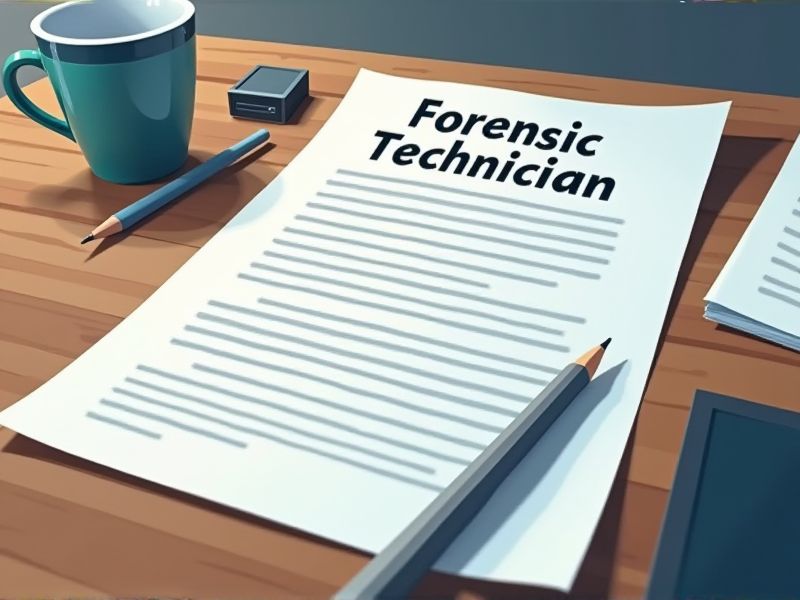
Forensic Technicians play a crucial role in crime scene investigations, requiring a high level of precision and specialized skills. Certain certifications are essential as they validate the technical expertise and ability to adhere to legal and procedural standards. These credentials ensure that technicians possess up-to-date knowledge about the latest forensic techniques and technologies. Here are some important certifications you may need as a Forensic Technician.
EnCase Certified Examiner (EnCE)
Obtaining the EnCase Certified Examiner (EnCE) credential enables a forensic technician to accurately analyze digital evidence using EnCase software, which is widely trusted in legal and investigative scenarios. The certification indicates a high level of competency in handling complex data extraction tasks, essential for maintaining the integrity of forensic findings. Employers often prioritize candidates with the EnCE certification because it demonstrates a verified skill set that aligns with the rigorous standards of digital investigations. Additionally, the EnCE credential can positively impact career advancement, as it is recognized as a benchmark of expertise in the field of digital forensics.
Certified Computer Examiner (CCE)
The complexity of digital evidence requires specialized skills, and a Certified Computer Examiner (CCE) provides the technical expertise necessary for comprehensive analysis. The certification ensures that forensic technicians adhere to recognized standards, enhancing the credibility of their findings in judicial settings. As cybercrime escalates, the demand for reliable and knowledgeable forensic technicians increases; the CCE designation validates proficiency in handling diverse digital forensics challenges. CCE-certified professionals contribute to maintaining legal compliance and effectively support law enforcement investigations.
Certified Forensic Computer Examiner (CFCE)
The demand for Certified Forensic Computer Examiners (CFCE) arises due to the increasing complexity of digital crimes, requiring specialized expertise to analyze digital evidence. Possession of the CFCE certification ensures that forensic technicians are equipped with standardized skills and knowledge for investigating cybercrimes. Employers and legal systems prioritize CFCE credentials to ensure credibility and accuracy in digital evidence handling. Forensic technicians with CFCE certification are more competent in presenting technical findings in legal settings, thereby influencing case outcomes effectively.
AccessData Certified Examiner (ACE)
Achieving AccessData Certified Examiner (ACE) status validates a forensic technician's proficiency with AccessData's forensic tools, affirming their ability to handle digital evidence effectively. Organizations require the ACE credential to ensure methodological consistency, which enhances the reliability of forensic investigations. This certification improves a technician's skills in identifying and analyzing complex data structures, essential for discovering digital artifacts. ACE-certified professionals contribute to maintaining legal compliance by employing best practices in evidence collection and analysis.
GIAC Certified Forensic Examiner (GCFE)
The GIAC Certified Forensic Examiner (GCFE) credential provides a structured framework for forensic technicians, ensuring they possess the necessary skills to handle complex forensic investigations. Organizations facing digital threats find that GCFE-certified experts can efficiently identify and analyze evidence, improving incident response times. As cyber attacks become more sophisticated, the credibility associated with the GCFE helps forensic technicians earn trust when presenting findings in legal contexts. With technology's rapid evolution, the continuous learning inherent in maintaining a GCFE certification ensures technicians stay updated with the latest forensic methodologies.
GIAC Certified Incident Handler (GCIH)
The GIAC Certified Incident Handler (GCIH) certification provides a forensic technician with specialized skills in identifying and responding to cyber threats. It enhances one's ability to handle security incidents promptly, minimizing potential data breaches. Having the GCIH certification demonstrates a technician's mastery in applying containment and eradication techniques in incidents. It provides recognition in the cybersecurity community, which is crucial for professional credibility and career advancement.
Certified Ethical Hacker (CEH)
Forensic Technicians need CEH certification to understand hacking techniques that cybercriminals use, equipping them with the skills required to effectively trace digital crimes. The certification aids in enhancing investigative methods by understanding vulnerabilities and securing digital evidence, thereby preventing data tampering during examinations. The ethical hacking knowledge provides a defensive strategy that complements forensic analysis, ensuring a comprehensive approach to cybersecurity incidents. With the rise in cybercrime complexity, possessing such certification becomes crucial to staying ahead in identifying and mitigating potential threats.
CompTIA Security+
CompTIA Security+ certification provides a foundational knowledge of cybersecurity principles, which is critical for forensic technicians in identifying and mitigating threats. Being well-versed in risk management helps forensic technicians to understand the potential vulnerabilities that can affect data integrity. Proficiency in security protocols gained through the certification aids technicians in the proper handling and analysis of digital evidence. Industry recognition of the certification enhances credibility and demonstrates a commitment to staying updated with evolving cybersecurity challenges.
Certified Cyber Forensics Professional (CCFP)
The Certified Cyber Forensics Professional (CCFP) certification enhances a Forensic Technician's ability to effectively handle digital evidence and investigations. With increasing cybercrime, possessing a CCFP ensures adherence to industry standards and best practices. This certification equips professionals with advanced knowledge in legal and ethical standards crucial for court-admissible evidence. Organizations prioritize hiring CCFP-certified technicians to mitigate risks and strengthen cybersecurity measures.
Certified Information Systems Security Professional (CISSP)
CISSP equips forensic technicians with a comprehensive understanding of security practices and policies, enhancing their ability to secure and analyze digital evidence effectively. The certification emphasizes risk management and legal frameworks, crucial for ensuring evidential integrity and compliance during forensic investigations. Possessing CISSP credentials can boost credibility and trustworthiness, as it signifies proficiency in the cybersecurity domain essential for forensic tasks. Organizations often prefer or require CISSP-certified professionals, as it aligns with industry standards for maintaining secure and reliable forensic processes.
Summary
When you obtain certifications as a Forensic Technician, your credibility in the field is significantly enhanced. This specialized training can lead to increased job opportunities and potential salary growth. Employers often view certified technicians as more skilled and knowledgeable, making you a more attractive candidate. Your capacity to handle complex forensic tasks improves, which can positively impact case outcomes and professional recognition.
